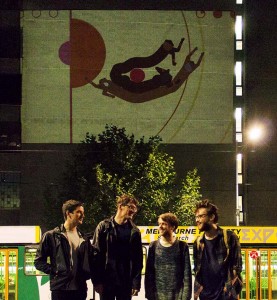When four friends got together last summer and started creating a video game for fun, they had no idea they would end up right at the centre of Melbourne’s thriving game development scene.
Their multiplayer sports game, Push Me Pull You, captured the imagination of local gamers in part because of its downright weirdness.
It has been less than a year, and the friends – Jake Strasser, Stuart Gillespie-Cook, Nico Disseldorp and Michael McMaster – have set up their own production company, and are travelling around the world talking about their game.
“Our original plan was like, okay well we’ll make something in a couple of weeks, then put it up on the internet for free and then just not really worry about it,” co-creator of the game Stuart Gillespie-Cook said.
“Then we showed it to friends and they had a really good time, and we thought maybe we should actually do this properly, keep going and do a really good job on it.”
The game has been recognised in the international games world, being featured and mentioned in some of the most prestigious games festivals and online communities.
Indie renaissance
The success of Push Me Pull You represents something bigger that’s going on in Melbourne’s world of video game development – a type of indie renaissance that has been building over the past few years.
“We feel like we haven’t really had to work that hard at it, it just kind of happened, and it’s been really really nice,” Gillespie-Cook said.
League of Geeks studio director Trent Kusters described the way the industry operated up until the global financial crisis hit, with Melbourne developers relying on lucrative contracts from video game publishers in the United States.
“You had an industry that after 15 years was this fully-fledged, large industry in which people made millions upon millions of dollars every year while having pretty much zero creative and cultural output,” he said.
After the global financial crisis hit and contracts from the U.S. dried up, the severe impact on those working in the Melbourne industry served as an impetus for the industry to transform and adapt to the new situation.
This led to an explosion of creativity, now reaching fever pitch.
“If the GFC had happened, and then digital distribution like Steam and the Appstore and things like that weren’t around, then there would have been nothing,” he said.
“There would have been no way that anyone could’ve ever gone indie.”


